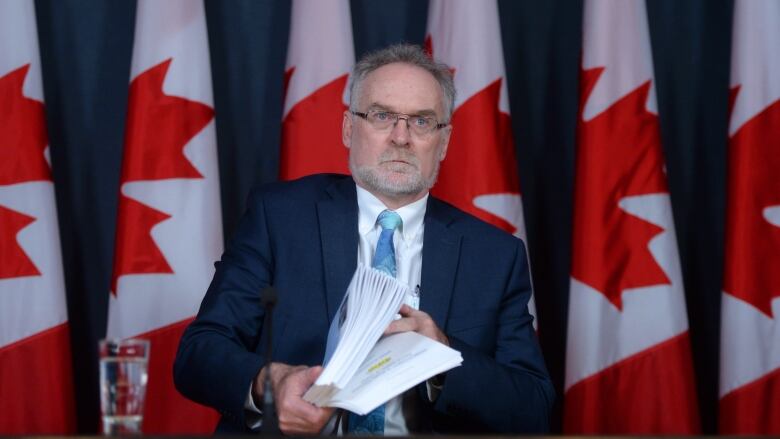Highlights of Auditor General Michael Ferguson's spring report
Auditor General Michael Ferguson has tabled his spring 2016 report. Read a list of highlights.
Spring 2016 report includes chapters on citizenship fraud, veterans drug benefits and army reserves

Auditor General Michael Ferguson has released his 2016 spring report. Here are some highlights of his report:
- Canada's auditor general is urging the Department of Veterans Affairs to get a handle on its drugs benefit program including the amount of medical pot being prescribed to veterans, which it found is "poorly documented" and not always based on evidence.
- The number of veterans receiving medical marijuana jumped from 112 in 2013-14 to 1,320 in 2015, and the cost rose accordingly: from $408,810 to $12.1 million. The audit estimates the cost could reach $25 million in 2016-17, nearly one third of the drug costs of the Veterans Affairs health benefits program.
- Veterans Affairs also lacks a "well-defined approach" for monitoring drug use among veterans, and does not monitor trends that could indicate "high-risk" behaviour. For instance, while it will not cover the cost of acetaminophen that exceeds the maximum recommended dose, no such limits exist for narcotics or sedatives.
- Efforts by the Department of Immigration to detect and prevent citizenship fraud werewere inadequate, resulting in citizenship being granted based without proper security checks.
- People with serious criminal records and others using potentially phoney addresses are among those who managed to secure Canadian citizenship, thanks to a system that doesn't do enough to root out fraud.
- Between 2008 and 2015, 50 different applicants used the same single address on their citizenship applications during overlapping time periods; seven of the applicants became Canadian citizens before the address was flagged during a residency fraud investigation.
- Compounding the problem, the auditor general said, was "poor information sharing" between the Immigration Department, the RCMP and the Canada Border Services Agency.
- Out of 38 criminal cases since 2010 involving a permanent resident or foreign national, the RCMP shared the relevant details with Immigration, Refugees and Citizenship Canada in only two of them.
- Immigration officials are looking at revoking the Canadian citizenship of about a dozen people after the auditor general found the government isn't doing enough to root out fraud in the citizenship system.
- Reserve soldiers are not fully prepared to deploy on missions due to the dwindling number of soldiers and a lack of equipment and training.
- Individual units of the Canadian Army's reserve units lack sufficient soldiers just 14,000 instead of a needed 21,000 as well as access to key equipment for domestic missions and clear guidance on training, counter to National Defence's stated goal.
- The number of Canadian Army reservists has dwindled by about five per cent, or about 1,000 soldiers per year between the 2012-13 and 2014-15 fiscal years.
- While the selection processes for governor-in-council appointments such as chairpersons and full-time appointees were open andtransparent, there was no documentation to support several part-time appointments.
- The Immigration and Refugee Board has long-standing vacancies that are contributing to decision-making delays: 21 positions are vacant, leading to wait times of an average of 18 months.
- Receiving short-term approval of its funding and corporate plan, often late in the fiscal year, has made it difficult forVia Rail to carry out its operations in an effective manner.
- The process of choosing fund managers for the government's $400-million "Venture Capital Action Plan," established in the 2012 budget, was onerous, laden with red tape and insufficiently fair, open and transparent, resulting in just nine submissions out of a possible 100 would-be candidates.
with files from CBC's Susana Mas












_(720p).jpg)


 OFFICIAL HD MUSIC VIDEO.jpg)
.jpg)



























































































